
GLA:D® stands for Good Life with osteoArthritis in Denmark and was introduced in Denmark in 2013 with the aim of implementing into practice international best practice guidelines to treat patients with knee and/or hip osteoarthritis.
Within 6 years, around 38,000 patients with knee or hip arthrosis have completed the programme. The programme’s effect is continuously evaluated and results show, among other things, substantial pain reduction, improved quality of life and reduced numbers of patients using painkillers and taking sick leave.
By now, the programme has been expanded to four more countries and, in 2020, GLA:D® will also be launched in Austria as a cooperation between the St. Pölten UAS and the 'Physiozentrum für Weiterbildung' (eng.: Physio Centre for Further Education) under the title “GLA:D® Austria”.
The GLA:D® Austria Programme
A comprehensive concept consisting of two parts, the GLA:D® Austria Programme is offered and carried out exclusively by certified GLA:D® Austria physiotherapists.
The first part comprises the realisation of a standardised, evidence-based, tried-and-tested consultation, instruction and exercise programme. The second part contains the scientific processing, analysis and preparation of patient data for the programme’s quality control.
This consultation, instruction and exercise programme is a programme tailor-made for the patients‘ individual needs and thus provides the options needed to control and intensify their personal programme. After completing the programme, the patients are equipped with the necessary competences to manage their knee and hip problems independently. The physiotherapists receive the required certificate by completing courses offered by the 'Physiozentrum für Weiterbildung'.
.jpg)
Visit of GLA:D® Initiator Prof. Dr. Ewa Roos (middle) | Copyright: St. Pölten UAS/Klaudia Jahodinski
Data Collection & Quality Control
To ensure the programme’s quality control, all patients‘ data is collected electronically, anonymised and forwarded to the Institute of Health Sciences at the St. Pölten UAS. At the institute, the data is evaluated and analysed. Selected results are forwarded to the central research project at the University of Southern Denmark. In this way, a worldwide dataset is created over time, which may be used for scientific purposes by all cooperation partners.
This enables the St. Pölten UAS to intensify the existing connection between research and teaching. The results are applied in science and new findings are directly incorporated into teaching. In addition, the large dataset also has great potential for new questions to be examined in bachelor and master theses, particularly for the students of the master degree programmes GAIT and Applied Clinical Research in Health Sciences (further details in September).
The data collection allows for reports to be made at the national and regional level. GLA:D®-certified physiotherapists can therefore control their programme’s quality on a patient level.
We are very glad that together with the 'Physiozentrum für Weiterbildung', we succeeded in bringing this unique programme to Austria. GLA:D® allows us to offer evidence-based treatment for patients with knee or hip arthrosis, which has been shown to be effective, and thereby make a major contribution to furthering high-quality healthcare.
– FH-Prof. Barbara Wondrasch, PhD (GLA:D® Project Leader)

.jpg
)
.jpg
)
.jpg
)
.jpg
)


